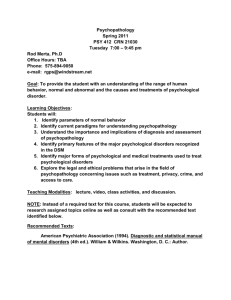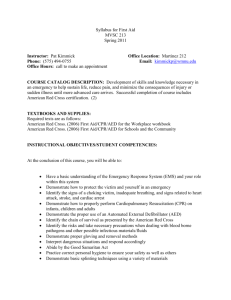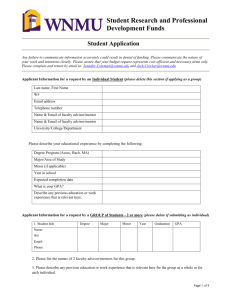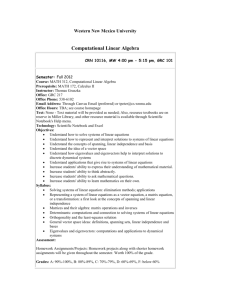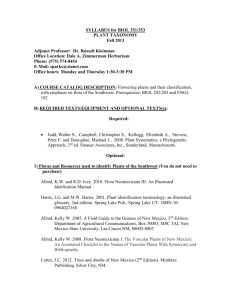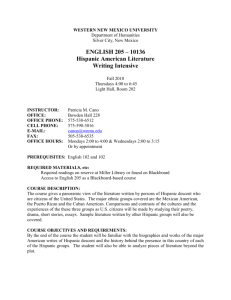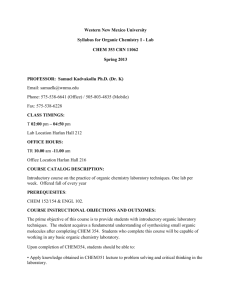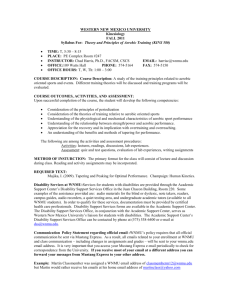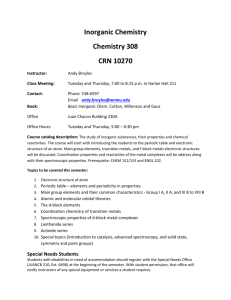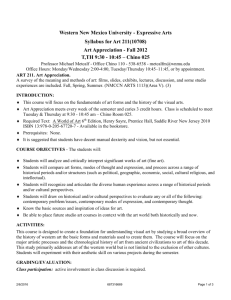MVSC 213 CRN 20993
advertisement
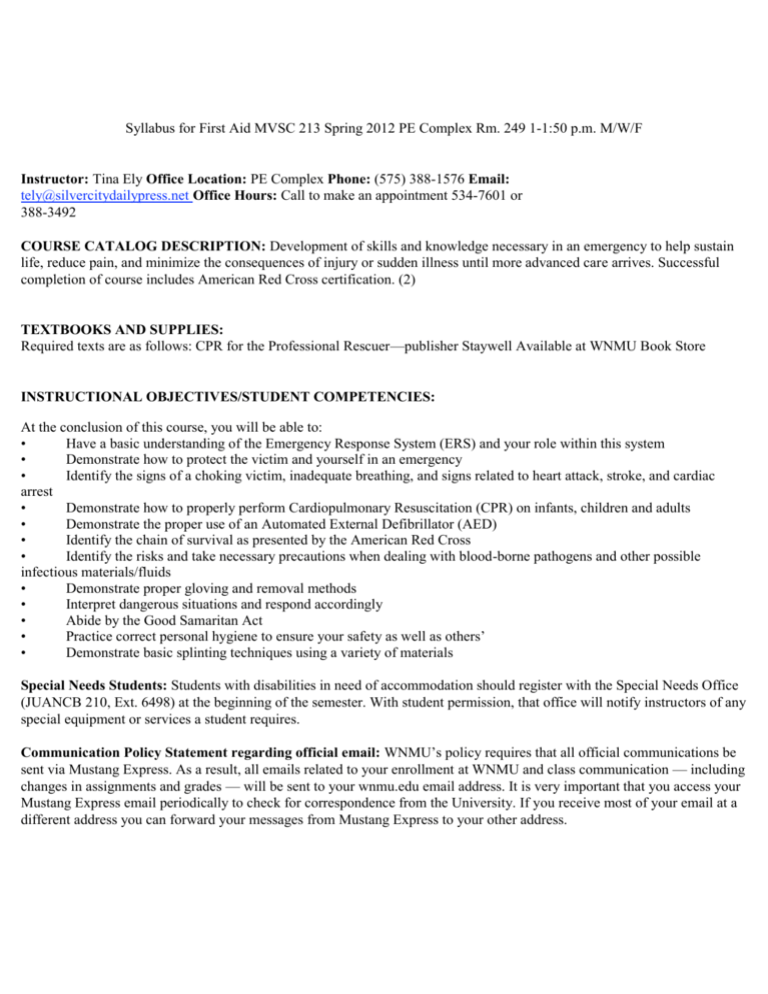
Syllabus for First Aid MVSC 213 Spring 2012 PE Complex Rm. 249 1-1:50 p.m. M/W/F Instructor: Tina Ely Office Location: PE Complex Phone: (575) 388-1576 Email: tely@silvercitydailypress.net Office Hours: Call to make an appointment 534-7601 or 388-3492 COURSE CATALOG DESCRIPTION: Development of skills and knowledge necessary in an emergency to help sustain life, reduce pain, and minimize the consequences of injury or sudden illness until more advanced care arrives. Successful completion of course includes American Red Cross certification. (2) TEXTBOOKS AND SUPPLIES: Required texts are as follows: CPR for the Professional Rescuer—publisher Staywell Available at WNMU Book Store INSTRUCTIONAL OBJECTIVES/STUDENT COMPETENCIES: At the conclusion of this course, you will be able to: • Have a basic understanding of the Emergency Response System (ERS) and your role within this system • Demonstrate how to protect the victim and yourself in an emergency • Identify the signs of a choking victim, inadequate breathing, and signs related to heart attack, stroke, and cardiac arrest • Demonstrate how to properly perform Cardiopulmonary Resuscitation (CPR) on infants, children and adults • Demonstrate the proper use of an Automated External Defibrillator (AED) • Identify the chain of survival as presented by the American Red Cross • Identify the risks and take necessary precautions when dealing with blood-borne pathogens and other possible infectious materials/fluids • Demonstrate proper gloving and removal methods • Interpret dangerous situations and respond accordingly • Abide by the Good Samaritan Act • Practice correct personal hygiene to ensure your safety as well as others’ • Demonstrate basic splinting techniques using a variety of materials Special Needs Students: Students with disabilities in need of accommodation should register with the Special Needs Office (JUANCB 210, Ext. 6498) at the beginning of the semester. With student permission, that office will notify instructors of any special equipment or services a student requires. Communication Policy Statement regarding official email: WNMU’s policy requires that all official communications be sent via Mustang Express. As a result, all emails related to your enrollment at WNMU and class communication — including changes in assignments and grades — will be sent to your wnmu.edu email address. It is very important that you access your Mustang Express email periodically to check for correspondence from the University. If you receive most of your email at a different address you can forward your messages from Mustang Express to your other address. Example: Martin Classmember was assigned a WNMU email address of classmemberm12@wnmu.edu but Martin would rather receive his emails at his home email address of martinclass@yahoo.com. Martin would follow the directions provided at http://www.wnmu.edu/campusdocs/direction%20forwarding%20email.htm WNMU Policy on Email Passwords: WNMU requires that passwords for access to all of the protected software, programs, and applications be robust, including complexity in the number of characters required, the combination of characters required, and the frequency in which passwords are required to be changed. Minimum complexity shall include: • Passwords shall contain at least six (6) characters • Passwords shall contain at least one capital (upper case) letter, and at least one symbol (numbers and characters such as @#%&”) • Passwords shall be changed at least every 90 days. Academic Integrity Policy and Procedures: Each student shall observe standards of honesty and integrity in academic work as defined in the WNMU catalog. Violations of academic integrity include “any behavior that misrepresents or falsifies a student’s knowledge, skills, or ability with the goal of unjustified or illegitimate evaluation or gain” (WNMU Faculty Handbook, 2008). Generally violations of the academic integrity include cheating and plagiarism. Refer to the 08-09 catalog for policy and definitions on pages 60 and 61. Cheating: “Using or attempting to use unauthorized materials … and unauthorized collaboration with others, copying the work of another or any action that presents the work of others to misrepresent the student’s knowledge” (WNMU Faculty Handbook, 2008). Penalties for infractions of “cheating” in this class are as follows: • • First Infraction — student will receive a “zero” or “no credit” for the assignment • Subsequent Infractions — shall result in an automatic failure of the course • Plagiarism: “the intentional or unintentional representation of another’s work as one’s own without proper acknowledgement of the original author or creator of the work” (WNMU Faculty Handbook, 2008). Penalties for infractions of “plagiarism” in this class are as follows: • First Infraction — The instructor will meet with the student to determine if the offense was due to lack of instruction. • • Second Infraction — The instructor will meet with the student to review the issue and subsequently file the Faculty Adjudication Form with the Academic Integrity Panel (AIP). The faculty will determine the action at this time in accordance with the information found in the 2008-2009 WNMU catalog (page 60 for undergraduates and 369 for graduate students). • Class Procedures for Inclement Weather: The decision on whether to close the University will be based on the condition of the campus streets and parking lots and the surrounding main arteries. Weather closing/delay information will be made available via WNMU web page, WNMU Mustang Express, radio stations, and TV stations. Students will be informed of weather-related classroom decisions using the following procedures: • Weather closing or delay of classes — students will be informed of such decisions via email, phone or posting on Mustang Express; a phone tree may be used; in case of class cancellations, professor will cover missed material in subsequent classes; • Weather is bad but remains open — class will be held for those that are able to get to class; alternative arrangements will be made to catch up students on work missed; • Instructor is unable to make it to campus due to weather — students will be informed via email, phone, or posting on Mustang Express; a phone tree may be used; instructor will cover missed material in subsequent classes; • Delays or closures during final exam week — students whose exams are canceled will be contacted to schedule makeup exams or alternative arrangements. Date Wk. 1: M/W/F Wk. 2: M/W/F Wk. 3: M/W/F Wk. 4: M/W/F Time Frame 1:00 – 1:50 p.m. 1:00 – 1:50 p.m. 1:00 – 1:50 p.m. 1:00 – 1:50 p.m. Tentative Schedule for Spring 2012 Assignment Introductions, Discuss Pathogens Pathogen Scenarios, History, Mission of Red Cross Worksheet, Discussion, Red Cross, Pre-Test Infant/Child CPR Practical, Personal, Protective Devices, CPR Infant, Child Practice Skills Infant/Child CPR Practice Skills, CPR Adult Pre-Test, Practice Skills CPR Adult Practice Skills, Scenarios, AED Discussion, Practice Skills Together CPR/AED Adult, Infant Child Standard First Aid Slips, Trips, Falls, Splinting, Bandaging Applying Splinting, Bandaging, Scenarios: CPR, First Aid and Practice Wk. 5: M/W/F 1:00 – 1:50 p.m. Wk. 6: M/W/F 1:00 – 1:50 p.m. Wk. 7: M/W/F Wk. 8: M/W/F Wk. 9: M/W/F Wk. 10: M/W/F 1:00 – 1:50 p.m. 1:00 – 1:50 p.m. 1:00 – 1:50 p.m. 1:00 – 1:50 p.m. Wk. 11: M/W/F 1:00 – 1:50 p.m. Choking, Heart Attack, Stroke, Skills Practice for the Above Wk. 12: M/W/F 1:00 – 1:50 p.m. Scenarios Practicing, HIV/AIDS Introduction Wk. 13: M/W/F 1:00 – 1:50 p.m. HIV/AIDS Prevention Wk. 14: M/W/F 1:00 – 1:50 p.m. HIV/AIDS Prevention HIV/AIDS Hispanic/Indian Culture Wk. 15: M/W/F 1:00 – 1:50 p.m. HIV AIDS new research S African American Culture, Responding to Emergencies Wk. 17: M/W/F 1:00 – 1:50 p.m. Disease Prevention/Emergencies, Final Test Vision Statement To ignite and nurture a spirit of learning for both educator and student Philosophy Statements 1. Educators recognize, accept, value, and promote diverse ideas, languages, and cultures. • A major portion of First Aid is acknowledging differences, appreciating differences, and supporting differences within a diverse classroom setting. • Learners demonstrate recognition and promotion of issues related to diverse ideas and backgrounds through feedback that they give to and receive back from each other and instructor. 2. Educators stress quality programs aligned with professional and state standards that produce exemplary results. • Learners demonstrate alignment with professional and state standards through their development of skills that support both professional and state standards. 3. Educators integrate theoretical knowledge into the world of practice through field-based experiences and reflection. • Students will develop their skills based upon the best practices identified in theory and proven in the field. • Students will further reflect upon theory and its application in practice through extensive scenario practice and class discussions. 4. Educators possess the skills and knowledge to effectively collaborate with parents, professionals — both within and across schools and agencies — and other community stakeholders. • First Aid skills are strengthened through collaboration with colleagues, parents, and students. Students will address these issues in the development of their skills and standardized assessment. 5. Educators advocate for equitable access and model thoughtful, effective, integrated use of technology resources. • Videos will be used to support and reinforce course materials and discussions. • Videos and manikins will be used to support learning, and help students understand the application of skills to the real world. • Students will facilitate one another’s learning by creating scenarios, prompting, and practicing skills together with positive feedback. Mission Statements Facilitating Active, Participatory Decision Making Learners will participate in discussions, role-plays, and other activities designed to foster constructive feedback and communication between the students. The instructor supports this. Assessment is based upon the completion of standardized tests, participation in class activities and discussions, role-playing different scenarios, and performance on necessary skills required to perform CPR and First Aid. Maximizing Opportunities for Student Thinking and Achievement Students will practice skills throughout the semester. They will design their own scenarios and determine the correct skills to be performed based upon the information of their scenarios. Students will provide feedback to each other to increase awareness of the chain of survival and necessary skills needed to perform CPR and First Aid.
